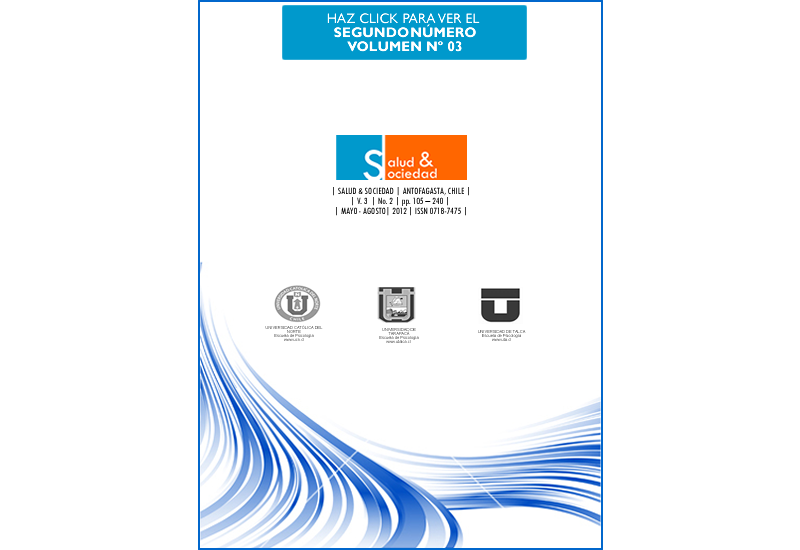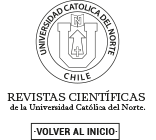Factores socio-estructurales y el estigma hacia el VIH/SIDA: Experiencias de Puertorriqueños/as con VIH/SIDA al acceder servicios de salud.
DOI:
https://doi.org/10.22199/S07187475.2012.0002.00005Palabras clave:
Estigma, Factores socio estructurales, Profesionales de la salud, VIH/SIDA, Stigma, Health professionals, Socio structural factors, HIV/AIDS,Resumen
El estigma relacionado al VIH/SIDA continúa afectando la prestación de servicios de salud y el bienestar físico y mental de las personas con VIH/SIDA (PVS). Recientemente la literatura científica ha señalado la importancia de comprender las manifestaciones de estigma más allá de las interacciones individuales. Por tal razón, investigaciones recientes en y fuera de Puerto Rico enfatizan la importancia de entender cómo factores socio-estructurales (FSE) influyen en los procesos de estigmatización social. Con el propósito de examinar los FSE que influyen en las manifestaciones de estigma relacionado al VIH/SIDA, realizamos y analizamos nueve grupos focales compuestos por hombres y mujeres en tratamiento para el VIH/SIDA que habían tenido experiencias estigmatizantes. Los participantes identificaron FSE relacionados a las manifestaciones de estigma, tales como el uso de viviendas especializadas, descentralización de los servicios de salud y el desarrollo de protocolos administrativos excluyentes en los servicios de salud. Los resultados demuestran la importancia de considerar los FSE en el desarrollo e implementación de intervenciones dirigidas a la población.
HIV/AIDS stigma continues to affect the provision of health services and the physical and mental well-being of people living with HIV/AIDS. The scientific literature has highlighted the importance of understanding stigma manifestations that surpass one-on-one social interactions. For that reason, social research in Puerto Rico and elsewhere has highlighted the importance of understanding the Socio-Structural Factors (SSFs) that foster HIV/AIDS stigma. With the objective of exploring the SSFs that influence stigma manifestations related to HIV/AIDS, we studied and analyzed 9 focus groups composed of women and men undergoing HIV/AIDS treatment who had experienced social stigma related to the disease. Participants identified SSFs that they understood were related to stigma such as the development of housing projects for people with HIV/AIDS, the decentralization of health related services, and health services administrative protocols that fostered exclusion. Results demonstrate the importance of addressing SSFs when developing stigma related interventions for this population.
Descargas
Referencias
Álvarez, MA (2000). Stress. Un enfoque integral. Ciudad de la Habana: Ed. Científico-Técnica.
Andrewin, A., & Li-Yin, C. (2008). Stigmatization of Patients with HIV/AIDS among Doctors and Nurses in Belize. AIDS Patient Care & STDs, 22(11), 897-906.
Avants, SK, Warburton, LA y Margolin, A (2001) Spiritual and religion support in recovery from addicting among HIVpositive injection drug users. J. Psychoactive Drugs 33, 39-45.
Dean, H. D., & Fenton, K. A. (2010). Addressing social determinants of health in the prevention and control of HIV/AIDS, viral hepatitis, sexually transmitted infections, and tuberculosis. Public Health Reports, 125 Suppl 4.
Fernández-Ríos, L y García-Fernández, J (2000). La religión como recurso para la promoción de la salud. Avances en Psicología Clínica Latinoamericana, 18, 23-56.
Goffman, E. (1963). Stigma: Notes on the manegement of spoiled identity. New York, NY: Simon & Schuster, Inc.
González, T. (2004). Las creencias religiosas y su relación con el proceso salud-enfermedad. Revista Electrónica de Psicología Iztacala, 7(2), 19-29.
Harrison, K., & Dean, H. (2011). Use of data systems to address social determinants of health: a need to do more. Public Health Reports, 126 Suppl 31-5.
Helm, HM, Hays, JC, Flint, EP, Koenig, HG y Blazer, DG (2001) Does private religions activity prolong survival?. A six-years follow-up study of older adults, J Gerontol a Biol Sci Med Sci, 55, 400-405.
Herek, G. & Capitanio, J. (1998). Symbolic prejuice or fear of infection? A functional analysis of AIDS-related stigma among heterosexual adults. Basic Applied Social Psychology, 20(3), 230-241.
Infante, C., Zarco, A., Cuadra, S. M., Morrison, K., Caballero, M., Bronfman, M., & Magis, C. (2006). El estigma asociado al VIH/SIDA: El caso de los prestadores de servicios de salud en México. Salud Pública Mex, 48, 141- 150.
Kang, E., Rapkin, B. D., Remien, R. H., Mellins, C. A., & Oh, A. (2005). Multiple dimensions of HIV stigma and psychological distress among Asians and Pacific Islanders living with HIV illness. AIDS & Behavior, 9(2), 145-154.
Li, L., Lee, S.-J., Jiraphongsa, C., Khumtong, S., & Iamsirithaworn, S., (2010). Improving the Health and Mental Health of People Living With HIV/AIDS: 12-Month Assessment of a Behavioral Intervention in Thailand. American Journal of Public Health, 100(12), 2418-2425.
Mackenzie, ER, Rajagopal, DE, Meibohm, M y Lavizzo-Mourey, R (2000) Spiritual support and psychological well-being: older adult’s perceptions of the religion and health connection. Altern Ther Health Med, 6, 37-45.
MacQuarrie, K., Eckhaus, T., & Nyblade, L. (2009). HIV-related stigma and discrimination: A summary of recent literature. UNAIDS, Retrieved from http://data.unaids.org/pub/Report/2009/20091130_stigmasummary_en.pdf
Marzán-Rodríguez, M., Cintrón-Bou, F. N., & Varas-Díaz, N. (2011). Más que una responsabilidad individual: Factores socioestructurales y el estigma relacionado al VIH/SIDA. Investigaciones en Psicología, 16(1), 83-94.
Nyblade, L., Stangl, A., Weiss, E., & Ashburn, K. (2009). Combating HIV stigma in health care settings: what works? Journal Of The International AIDS Society, 12(1), 15.
Ortiz, O. (2008). Estigma y discriminación en los servicios de prueba de VIH con orientación en el sector privado en Guatemala: Un estudio cualitativo. Bethesda, MD: Private Sector Partnerships-One Project, Abt Associates, Inc.
Oturu, K. (2011). Stigma in access to HIV treatment in african settings: The importance of social connections. The Grounded Theory Review, 10(2), 63- 90.
Parker, R., & Aggleton, P. (2003). HIV and AIDS-related stigma and discrimination: a conceptual framework and implications for action. Social Science & Medicine, 57, 13-24.
Pérez, C. M., Marrero, E., Meléndez, M., Adrovet, S., Colón, H., Ortiz, A. P., et al. (2010). Seroepidemiology of viral hepatitis, HIV and herpes simplex type 2 in the household population aged 21- 64 years in Puerto Rico. BMC Infectious Diseases, 10(76).
Scambler, G. (2006). Sociology, social structure and health-related stigma. Psychology, Health & Medicine, 11(3), 288-295.
Schuster, M., Collins, R., Cunningham, W., Morton, S., Zierler, S., Wong, M., Tu, W., & Kanouse, D. (2005). Perceived discrimination in clinical care in a nationally representative sample of hivinfected adults receiving health care. J Gen Intern Med., 20(9), 807-813. doi: 10.1111/j.1525-1497.2005.05049.x
Strauss, A. (2003). Qualitative analysis for social scientists. Cambridge, United Kibgdom: Cambridge University Press.
Vanable, P., Carey, M., Blair, D., & Littlewood, R. (2006). Impact of hivrelated stigma on health behaviors and psychological adjustment among hivpositive men and women. AIDS and Behavior, 10(5), 473-482.
VandeCreek, L, Pargament, K, Belavich, T, Cowell, B, Friedel, L (1999) The unique benefits of religious support during cardiac bypass surgery. J Pastoral Care, 53, 19-29.
Varas-Diaz, N., & Marzan-Rodriguez, M. (2007). The emotional aspect of AIDS stigma among health professionals in Puerto Rico. AIDS Care, 19(10), 1247-1257.
Varas-Díaz, N., Neilands, T. B., GuilamoRamos, V., & Bou, F. N. C. (2008). Desarrollo de la Escala sobre el Estigma Relacionado con el VIH/SIDA para Profesionales de la Salud mediante el uso de métodos mixtos. Revista Puertorriqueña de Psicología, 19.
Varas-Díaz, N., Neilands, T. B., Rivera, S. M., & Betancourt, E. (2010). Religion and HIV/AIDS stigma: Implications for health professionals in Puerto Rico. Global Public Health: An International Journal for Research, Policy and Practice, 5(3), 295-312.
Varas-Díaz, N., Serrano-García, I., & ToroAlfonso, J. (2005). AIDS related stigma and social interaction: Puerto Ricans living with HIV/AIDS. Qualitative Health Research Journal, 15, 169-187.
Yannessa, J. F., Reece, M., & Basta, T. B. (2008). HIV Provider Perspectives: The Impact of Stigma on Substance Abusers Living with HIV in a Rural Area of the United States. AIDS PATIENT CARE and STDs 22(8), 669-675.
Young, Iris Marion (1990). Justice and Politic of Difference. New Jersey: Princenton University Press
Descargas
Publicado
Número
Sección
Licencia
Los autores continúan como propietarios de sus trabajos, y pueden volver a publicar sus artículos en otro medio sin tener que solicitar autorización, siempre y cuando indiquen que el trabajo fue publicado originariamente en Revista Salud & Sociedad (ISSNe:0718-7475).



_(1).png)





